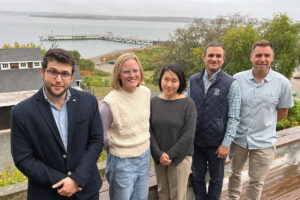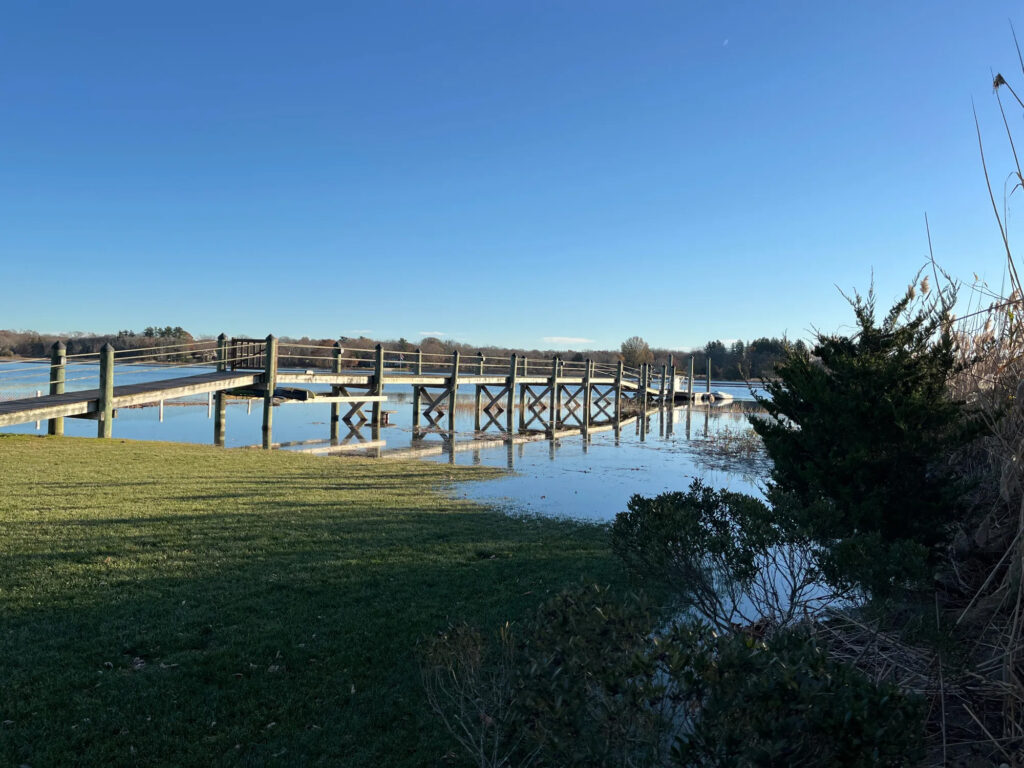URI Research and Outreach Team Seeks Community Input on Priorities, Concerns
Rhode Island is one of the most low-lying states in the U.S., and the town of Warren is among its most flood-vulnerable municipalities.
A research and outreach team from the University of Rhode Island is working with Warren to better understand its concerns related to flooding and to explore potential solutions. The team, led by Emi Uchida, professor and chair of the Department of Environmental Natural Resource Economics, includes Christopher Russoniello, assistant professor of geosciences; Pengfei Liu, associate professor of environmental and natural resource economics; and Mehrshad Amini, assistant professor of civil and environmental engineering and ocean engineering; along with Eliza Berry, a climate resilience specialist with Rhode Island Sea Grant; and Nathan Vinhateiro, science director of the Coastal Institute.
The project, funded by a National Science Foundation grant that also includes projects in Delaware and South Carolina, had its Rhode Island kick-off meeting in late August as part of a regular meeting of the Warren Health Equity Zone’s Safety & Community Resilience Work Group. Over two dozen Warren residents, town employees, and members of community groups attended and heard presentations from the research and outreach team and provided feedback on their priorities.
- Amini discussed the flooding vulnerability in Warren, and the importance of detailed drainage maps and evaluating the risk to infrastructure, buildings, and transportation systems.
- Russoniello explained the importance of groundwater modeling in understanding flooding risks as well as understanding the interaction between surface water and groundwater.
- Uchida discussed the economic impacts of flooding and groundwater salinization and told the attendees that the team would conduct assessments of people’s preferences for different adaptation strategies.
- Berry explained that the feedback from the community would be used to prioritize research areas and inform the development of mitigation strategies.

Emi Uchida, center, principal investigator on a $1.5 million National Science Foundation EPSCoR grant, with her team on the project: from left, Mehrshad Amini, Eliza Berry, Christopher Russoniello, and Nathan Vinhateiro. Not pictured is team member Pengfei Liu. URI photo by Tony LaRoche.
Uchida made it clear that the project will take a holistic view of coastal resilience in the area.
“It’s not just about how communities adapt to flooding and salinization, but also how these challenges connect to local livelihoods. We want to understand which adaptation strategies people support, how factors like location and income shape those preferences, and what financing tools can help build broader public support.”
Another research question, she said, would look at property values in coastal areas: “Are risks such as flooding and groundwater impairment are beginning to lead to lower home values in coastal communities?” By linking environmental, social, and economic dimensions, the project aims to provide communities with practical pathways toward long-term resilience.
“We unfortunately don’t have billions of dollars for massive infrastructure improvements,” Berry acknowledged about the project. “However, we do bring in a lot of research expertise, and we’re hoping that if we really ask the right questions about the types of adaptation solutions that could potentially be applied here, it can set the town and the community up to go after bigger funding in the future.”
This meeting was the first of several in Warren that will discuss the project with interested community members. To receive ongoing information about this project, please contact Eliza Berry at eliza.berry@uri.edu.
- To view the presentation videos, click here.
- To see the presentation pdfs, click here.

